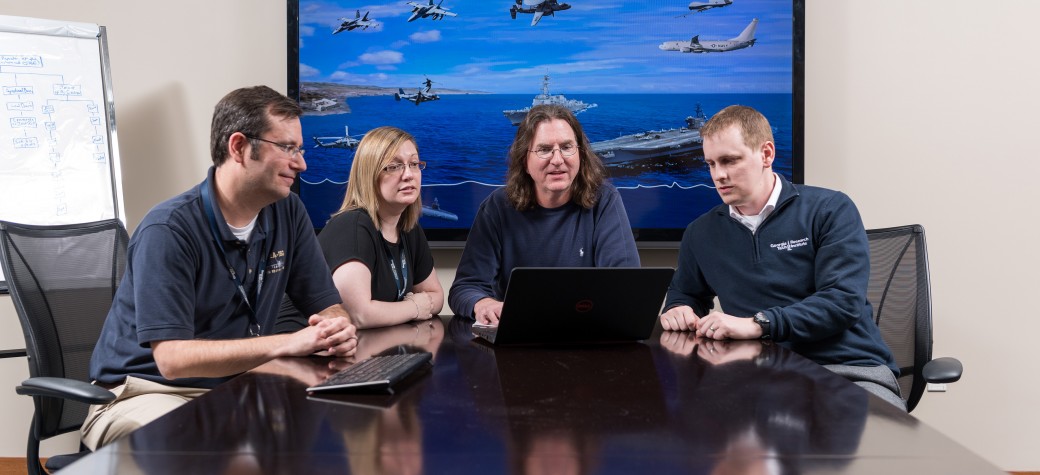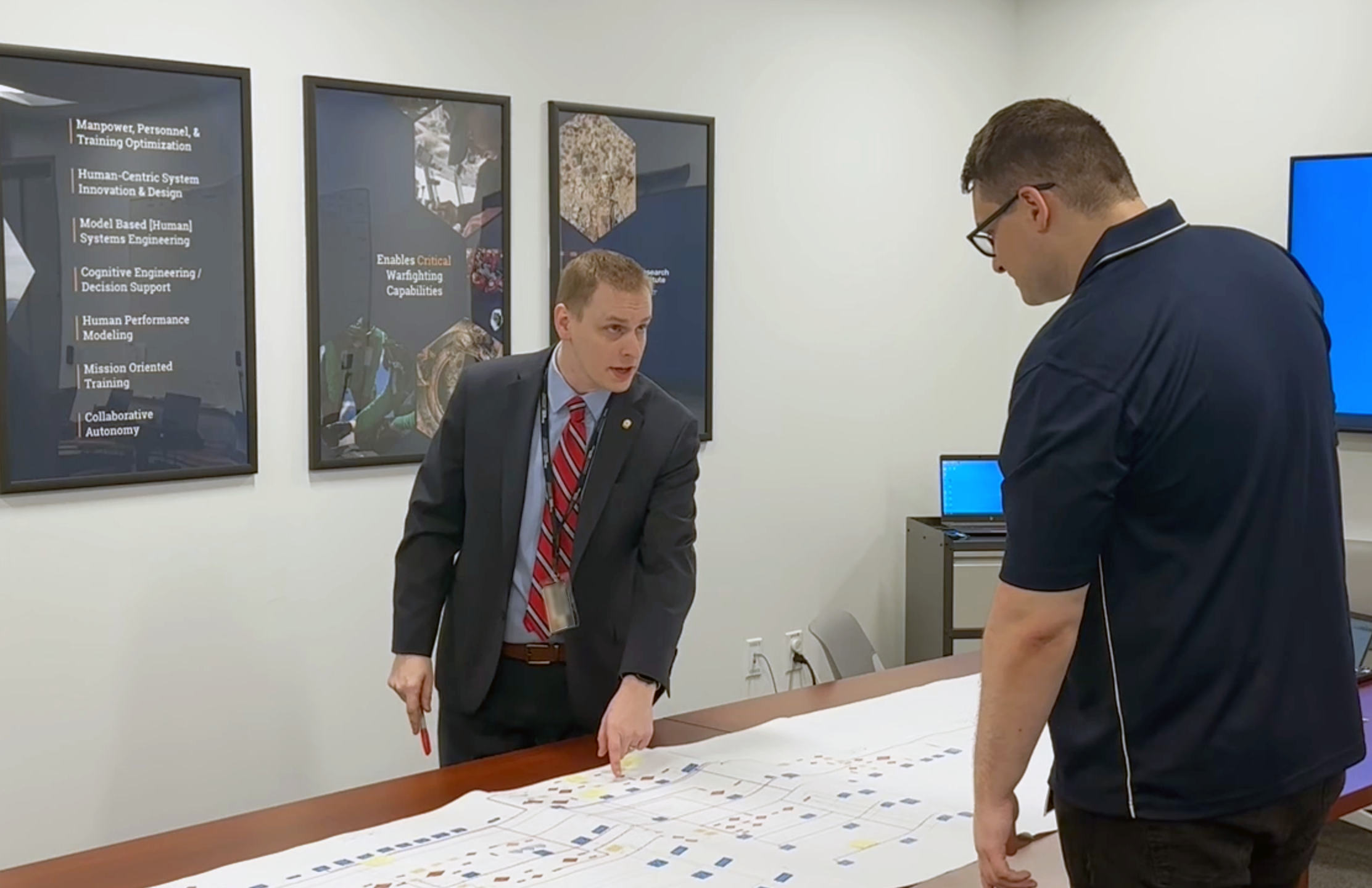
The National Defense Industrial Association (NDIA) Human Systems Division recently announced the election of Stuart Michelson, Associate Division Chief in the Applied Systems Laboratory’s (ASL) Human Centered Engineering Division at the Georgia Tech Research Institute (GTRI), as its new Chair. The announcement was made during NDIA’s annual conference in Arlington, Virginia, earlier this spring.
Michelson's election marks a significant milestone in his career, reflecting his deep commitment to Human Systems Integration (HSI). Since he arrived at GTRI in 2007, Stuart has developed a reputation as an international subject matter expert in Human Systems Engineering and human experience with unmanned systems.
Stuart leads HSI efforts for Department of Defense (DoD) customers, specializing in areas such as:
- Tactical display design spanning command and control training.
- UxV Technologies’ ground control stations
- Manned-unmanned teaming.
- Electronic warfare.
- Mission planning.
'Good' Systems Integration

In his remarks, Michelson emphasized, "Good Systems Engineering is, and must be, good Human Systems Integration."
“Too often in DoD circles, the entire emphasis is on hardware and technology development. Sometime later, the human is considered, causing engineering teams to wrestle with figuring out ways to fit a warfighter into what they designed,” Stuart explains. “Simply put, this costly approach is one that leads to mission failure, loss of systems, and worst of all, loss of human life," Michelson said.
His focus on integrating human-centered requirements from the outset is driven by a passion for advocacy in Human Systems. "There is no denying that the data across both public and private sectors reinforce the criticality of early consideration of human-centered requirements," he added.
Throughout his career at GTRI, Michelson has championed the promotion of HSI and impactful Human Factors Engineering on DoD programs. His role as Associate Division Chief has provided him with a platform to influence the integration of HSI into various defense technologies.
"My entire career at GTRI has been focused on the promotion of Human Systems Integration (HSI) and impactful Human Factors Engineering on DoD programs. Focusing on HSI is not only the best way to protect human life, but is the way that DoD program managers can reduce risk, optimize system performance, and reduce ownership cost," he emphasized.
Michelson's leadership extends beyond GTRI, maintaining volunteer roles within the Association for Unmanned Vehicle Systems International and having previously served as Deputy Chair of the NDIA Human Systems Division. This experience has equipped him with the expertise needed to facilitate meaningful exchanges between government, industry, and academia on human performance, Human Factors, and HSI. "I am inherently attracted to any role where I can do my part to promote Human Systems within the DoD, and am most honored to have been elected as the Chair of the National Defense Industrial Association’s (NDIA) Human Systems Division," Michelson remarked. His leadership role in GTRI’s Human Centered Engineering Division and his past service as Deputy Chair have prepared him well for this new role as Chair.
In discussing the criticality of HSI in Systems Engineering, Michelson stated, "Implicit to good Systems Engineering is Human Systems Integration because HSI is a Systems Engineering process that ensures all human-related technical concerns are properly addressed during system analysis, planning, design, development, and testing."
He stressed that HSI is both a management and technical strategy, integrating domains such as Human Factors Engineering, Manpower, Personnel, Training, Safety, Survivability, Habitability, and Occupational Health throughout a program's lifecycle. "Not only does a deliberate HSI program strategy help Systems Engineers manage tradeoffs across the aforementioned domains, but it ensures that these tradeoffs are drivers for effective, efficient, affordable, and safe system designs," Stuart explained.
Incorporating ‘Humanness’ into Technology

Michelson’s personal experience significantly influences his approach as Chair of the NDIA Human Systems Division.
He noted, "As researchers, we must champion technologies that are the process of a deliberate human-centered strategy rooted in a clear definition of 'mission.' This is the only way we can optimize human performance in dynamic battlespaces, protect the warfighter’s cognitive and physical well-being in extreme environments, and in so doing – ensure successful and effective operations in air, land, sea, space, and cyberspace domains."
Stuart's career as a GTRI researcher and HSI educator has equipped him with a broad skill set and a broad range of expertise in Human Systems. His work spans various domains, including electronic warfare and unmanned systems, where human systems considerations play a crucial role.
"Humans are central to everything the DoD does. Manpower is the single largest cost driver in the DoD. Even as systems increasingly adopt automated functions and artificial intelligence-driven teammates work alongside humans in the future, the need to quantify the relationship of humans and these entities on the battlefield must remain one of the most pressing priorities for DoD," Michelson explained.
He emphasized the importance of addressing specific needs in the human systems domain, such as trust in automation, novel command and control techniques, natural communication, human workload and performance, and next-generation human-machine interfaces.
"It is critical that Human Systems practitioners in the DoD don’t simply list these topics as prominent needs, but begin to show program managers how to meet these challenges as part of deliberate Human Systems Integration planning," he said.
Looking to the Future

Looking ahead, Michelson identified education as a major challenge for the Human Systems community. "The most prominent challenge I see before the Human Systems community at large is education. Since HSI, in particular, is the responsibility of a program manager, they need more than a DoD Instruction telling them it is important and that they should implement it. Rather, they need resources and training on how to do it well," he stated.
He believes that educating program managers and Systems Engineers on the distinctions between the technical domains of HSI is crucial. "Too often Human Systems practitioners are thought of as merely the 'safety people' or the 'training people' instead of seeing how they can bring into harmony the considerations across these and other technical domains to the deliberate benefit of a program," Michelson noted.
Michelson also highlighted an emerging opportunity to integrate HSI into the DoD's increasingly emphasized Digital Engineering efforts.
"A major opportunity for the Human Systems community I see is the development of new frameworks for the integration of HSI planning in acquisition into emerging Digital Engineering efforts. If done properly, this can transform how we write, implement, and evaluate system requirements," he said.
Stuart envisions a future where the Human Systems community embraces novel elements such as Human Readiness Levels alongside specific Human Systems techniques like task analyses, iterative design processes, and evaluation exercises. "A focus on these emerging opportunities paired with an emphasis on engagement with Human Systems practitioners early and often in a program's lifecycle is a recipe for affordable DoD mission success," Michelson concluded.
‘Integrating’ GTRI’s and NDIA’s Missions
The National Defense Industrial Association (NDIA) drives strategic dialogue in national security by identifying key issues and leveraging the knowledge and experience of its military, government, industry, and academic members to address them.
NDIA, comprised of its Affiliates, Chapters, and Divisions--as well as 1,780 corporate members and 65,000 individual members--is a nonpartisan, non-profit educational association. It was founded to educate its constituencies on all aspects of national security.
GTRI’s mission statement proclaims that “GTRI's mission is to advance technology and provide solutions to improve the human condition, enhance economic development in Georgia, and serve national security.”
GTRI, as a corporate member of NDIA, continues to support the organization's mission to promote meaningful exchanges and collaboration within the defense community. Michelson's new role as Chair of the NDIA Human Systems Division underscores the importance of human-centered design in defense technology and reinforces GTRI's commitment to advancing HSI in the DoD.
Writer: Christopher Weems
GTRI Communications
Georgia Tech Research Institute
Atlanta, Georgia
The Georgia Tech Research Institute (GTRI) is the nonprofit, applied research division of the Georgia Institute of Technology (Georgia Tech). Founded in 1934 as the Engineering Experiment Station, GTRI has grown to more than 2,900 employees, supporting eight laboratories in over 20 locations around the country and performing more than $940 million of problem-solving research annually for government and industry. GTRI's renowned researchers combine science, engineering, economics, policy, and technical expertise to solve complex problems for the U.S. federal government, state, and industry.



